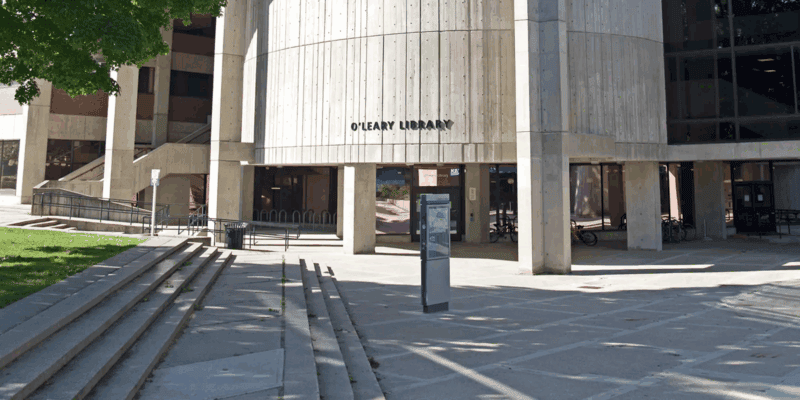Libraries Investing Ahead: An interview with Amanda Rust
Guardian of the past, enabler of the future: Amanda Rust is our guest this month as we dive into the challenges and opportunities of American higher education in an era of global instability.
Click here to catch up with previous instalments of Libraries Investing Ahead
The textile mills of Lowell, Massachusetts (pictured above) were an important hub during America’s Industrial Revolution in the nineteenth century. Today, this heritage is being given a new lease of life at the University of Massachusetts Lowell, a relatively recent addition to the state’s higher education system. Amid budget cuts and uncertainty across American academia, UML’s unique position makes it an intriguing subject for Libraries Investing Ahead. Amanda is Associate Director of Research and Learning at UML’s University Library. The interview was conducted by Gold Leaf‘s Linda Bennett.
Linda Bennett: Could you tell us a bit more about UML – for example, how old it is, does it have any specialisms, does it have a strong research tradition?
Amanda Rust: UML has achieved R1 status, but only recently – last year, in fact. This was because the US body that issues the classification for the R1 and R2 university categories changed the standards. The process was simplified – and UML was already on the cusp of being an R1. It offers a broad range of subjects at both undergraduate and graduate level, with particular strengths in Health Sciences, STEM subjects, Business, Criminal Justice and Education. At undergraduate level, the Social Sciences represent the largest group of programs.
Some of the specialisms are driven by its very interesting history – UML only became part of the state system in 1991. Before that it consisted of two separate colleges, one of which was originally a teacher training college and the other specializing in textiles and technology. The university occupies a large role in American textile production and today materials engineering is one of its top specialisms – after industrialization, the program became focused on chemistry and plastics, as well as yarns and cloths.

LB: Libraries across the world are experiencing budget squeezes at the moment, but libraries in the USA, despite their historically large budgets, are for political reasons probably suffering more uncertainty than elsewhere in the world. Could you tell us what your main budgetary challenges are and how you alleviate them?
AR: Budget cuts don’t follow a typical format and vary significantly from state to state. UML is primarily tuition-driven, so the budget depends on enrolment. It is recognized to be strong in certain fields that give students stable careers when they’ve graduated, so enrolment has bounced back since the pandemic.
This mitigates any state budget cuts: while we are a grant-receiving institution, the grant represents a smaller percentage of the total budget than at many US universities. For us, therefore, the greatest concern is the effect both national and global instability has on the students. How will they manage to pay their expenses? And what will happen to the federal funding for students’ PhDs? We feel we have to hoard our money and prepare for the worst. It is difficult to plan even when things are not immediately difficult, and we think this situation will stay the same for at least the next couple of years. The library does seek out donors and recent areas of success have been particularly in archives and special collections.
LB: Could you tell us a little more about these and other fund-raising activities?
AR: We have several community-curated, community-housed collections. Some are very connected to the historic communities of this area and engagement with them is still very vibrant. People will fund-raise to collect often smallish amounts, but they carry on repeating the process, so the funds mount up over time.
“The last several years have reinforced my commitment to a quality education for everyone.”
There are opportunities to apply for larger grants, but there is currently so much unpredictability in the US that we do not look to them as a stable source. We also have a very close relationship with the university’s central advancement office, so the library might be mentioned in general fund-raising appeals or included in outreach to alumni.
There are some very special community archives – for example, we have built a Portuguese -American archive, spearheaded by a faculty member. There is also a South East Asian-American archive. These archives are supported by a large network of people and foundations across Massachusetts, with key collecting, processing and digital infrastructure provided by UML’s Center for Lowell History staff and archivists.
LB: What are the challenges that you face besides financial ones? For example, open access (OA), publishers’ business models, finding the right content for courses, supporting researchers with ever-more-sophisticated content needs.
AR: I don’t feel negative about OA. I think that what the OA movement has done is to help us to think a lot more about how the information business industry is constructed. We have had much more transparent discussions about business models. No beautiful solution has yet been found, but there is much more common knowledge about, and interest in, what the actual business is.
An ever-present challenge is that we always hope to be able to hire more staff. We are constantly having to do more with fewer people. I’m a bit skeptical about the digital tools that we all use now – I don’t think they save time, you just end up spending the same time doing different things. Everyone now uses mostly online systems – for example, for travel requests, getting reimbursed for conferences, etc. – and it just spreads out the work. I suppose it may be faster than having to walk round to someone’s desk, but it is much more complex. AI is of course at the pinnacle of this complexity. We’re just beginning to think about its role in collection development, teaching and learning.
“We also want to bring more fun to the library experience!”
We do offer a great deal of support to researchers. Over time they have become more aware of OA, but the details are not always clear to them. There are different mandates from different countries and states, and each publisher has its own set of requirements. We have just started an outreach service for researchers and so far they have been more interested in data management. The idea of sharing data as part of OA has become common enough for them to need to know how to set up a lab that enables them to share their research data when it is complete.
LB: What are your future plans for developing your role in the library and the services the library offers?
AR: We have so many! Our library – like many others – had a series of staff retirements and we are building some new things with new people. We want to continue to find new ways to provide outreach for students: where the library is able to engage with them, the results are very effective, but fewer now come to campus on a regular basis, so we need to develop inventive new ways of teaching library skills online.
We also want to bring more fun to the library experience! Our students and faculty work very hard. We want them to be able to embrace the library as a place where they can find interesting books and movies to enjoy.
We’re also launching a new institutional repository and working through things like impact factors. Among our hopes and dreams are finding the opportunities to do more with the community archives and digital collections.
LB: Tell us a little about yourself. How long have you been a librarian? Do you have time for hobbies?
AR: I spent one year as an assistant language teacher, but aside from that I have always worked in libraries as a staff member. I completed my Library Science Masters in 2004 and altogether I’ve worked in libraries for about 25 years. I do feel that the last several years have reinforced my commitment to a quality education for everyone. I’m interested in other aspects of librarianship: I’ve always been curious about school and public libraries and literacy teaching.
I live in Shrewsbury, Massachusetts, which has an amazing public library – though lots of libraries in small towns in the US are now volunteer-run. I think it’s because their populations diminish so much in the winter months when the tourists are no longer there, so there isn’t the funding. I do have some hobbies. Of course I like to read a good book, and I work in the garden. My husband and I have only lived here for three years, and the garden needs some attention. My particular job is to tame the wisteria before it takes over!
“For us, the greatest concern is the effect both national and global instability has on the students.”
LB: In the USA and many other parts of the world, higher education has been under attack in recent years. What do you think will happen to higher education – and, by extension, the libraries that serve universities – in the next 2-3 years?
AR: I think – and hope – that things are changing a little. Adverse reporting in the media does a lot of damage. People get very upset, therefore, about what they think is happening, but it mainly affects the best-known institutions, such as Harvard and Columbia. I’d say about ten schools are involved, out of a national total of more than 4,000.
Some good can come of it – I hope that as higher education becomes a hot topic, people will really look at community colleges and get to know better what they offer. I’m all for expanding access to education – through teaching trades, apprenticeships, other more affordable types of qualification, and I hope that more people will get to choose what they want to do.
Read this short introductory post to learn more about the blog series Librarians Investing Ahead.
If we can break through the bad publicity, what is really happening in US education will become much clearer. For example, some states are looking at increasing taxes to pay for free commercial college pathways for students. I am optimistic about the future, and how librarians can help more students to succeed.
LB: Amanda, huge thanks for all your insights and invaluable perceptions.
You might also be interested in this blog series
[Title Image: Textile mill working all night in Lowell, Massachusetts. Credit: Jack Delano, Farm Security Administration – Office of War Information Photograph Collection (Library of Congress)]
